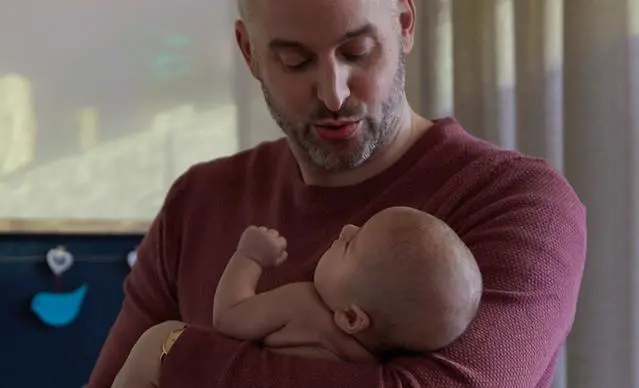Learn the JOHNSON’S® 3-Step Bedtime Routine
Start a baby bedtime ritual with 3 easy steps!

Step 1
Warm Bath

Step 2
Baby Massage

Step 3
Quiet Time
Related Products: JOHNSON’S® 3-Step Bedtime Routine
There’s Science Behind JOHNSON’S® 3-Step Bedtime Routine
A good night’s sleep is scientifically proven to improve the overall health, cognitive ability, mood and happiness of you and your little one. We’ve worked with researchers, scientists and sleep experts and evaluated over 300,000 baby sleep profiles to identify the importance of multisensory bedtime rituals. We’ve developed our clinically proven 3-step JOHNSON’S® BEDTIME® Routine to help baby fall asleep faster and stay asleep longer.
The Science of Lullabies
Song can help your baby drift into sleep quick.
Sleep Guides
Newborn Sleep
Most babies don’t sleep for more than two to four hours at a time – day or night. You might be accustomed to sleep deprivation, and some even call it a new mom’s rite of passage. There are ways however, to help ease your newborn into a regular schedule so you can both sleep better and sooner.
Newborns Wake Up – A Lot
Newborn sleep patterns vary widely, they can get a total sleep time of 10 to 18 hours per day, and they’ll usually sleep equally spaced throughout the 24-hour day. There’s no real difference between day and night for them, so you’ll be tending to them at all hours of the day for the first few months. Newborns will generally sleep 2 to 5 hours at a time and signal when they need your help with feeding and diapering.
Teach the Difference Between Night and Day
You’ll want to engrain the difference between night and day with your newborn to lengthen their period of sleep in the evening. During the day, keep the lights on and keep sounds at regular levels. When the sun is starting to set, turn off the lights, use a night-light, feed/change baby calmly and quietly, and start limiting your interactions to just holding them gently.
Why Your Newborn Wakes Up
For the most part, your newborn will waken and signal for you because they’re hungry or require a diaper change. If you notice any sudden changes in your newborn’s sleep patterns, it may signal illness or a hunger-inducing growth spurt.
Moms Need Naps Too!
Try to nap the same time as baby does. It’s tempting to try to do chores when baby’s asleep, but you’ll find you’ll cope better when you align your schedule with theirs.
SIDS (Sudden Infant Death Syndrome)
Minimize the chances of SIDS by putting your baby down to sleep on his back and not their tummy. Choose a firm mattress that is clear of any fluffy or loose bedding, stuffed animals or pillows. For more on newborn sleep safety, visit Public Health Agency of Canada.
Baby Sleep (6 weeks +)
Thankfully, after the 3-month mark, you’ll start to notice baby sleeps longer during the night – hooray! Now’s your opportunity to try to get back to a regular-ish sleep schedule. Baby sleep rhythms begin to develop at around 6 weeks, and most babies are developmentally capable of regular sleep-wake cycles by 3 to 6 months. Since you’ve been working to cultivate baby’s understanding of night and day, you’ll find now’s the opportune time to try a few more helpful tricks to improve their sleep-time routine.
Teach Your Baby to Soothe Himself
Try to teach baby to fall asleep independently by putting them down when they’re drowsy but awake. Eventually they’ll be able to soothe themselves to sleep, which is integral for when they wake in the middle of the night.
What to Avoid
Try to stick to a bedtime routine that is practical to revisit every day. Avoid rocking or feeding baby to sleep, as you’ll likely be doing that when baby naturally wakes up during the night. Put baby to bed when they’re drowsy but still awake, so they’ll learn how to soothe themselves to sleep. And make sure you take turns with your partner putting baby to bed.
How much should babies sleep?
Every baby is different, but after 3 months, babies will generally sleep between 13 to 15 hours a day.
Changes in Baby Sleep Patterns
As baby reaches developmental milestones (like rolling over and pulling themselves up to stand), it can actually temporarily disrupt your baby’s sleep patterns. Just stick by your routine and baby will eventually get back to their regular sleeping pattern.
How long should my baby nap?
Babies will typically nap 2 to 4 times a day. Cutting back on naps won’t help at night – it’ll actually increase overtiredness and a worse night’s sleep – just try to avoid naps closer to bedtime.
Keep the Bedtime Routine Going!
Continuing a bedtime routine will keep your baby on a schedule.
Toddler Sleep (6 months +)
Now that baby is becoming a toddler, there are a new set of challenges that you may encounter when trying to get them sleeping peacefully in bed. Continue your bedtime ritual – it’ll help ease them into bed while you’re continuing to strengthen your bond and connection to them. You’ll notice their independence, but they’ll still have many of the same needs as when they’re younger – a lot of attention. Continue to give lots of cuddling and helping them get to sleep through a sustained bedtime ritual. Toddlers will still require 12 to 14 hours of sleep in total: 11 to 12 hours at night and 1 to 3 hours during the day.
Toddler Sleep Time
Toddlers will likely have adapted to a sleep cycle that carries them through the night. That said, stressful events or changes like moving them from the crib to a bed at too early an age, a trip or illness may cause temporary setbacks.
These toddler bedtime tips will help to ensure your toddler gets the rest and sleep he needs:
Try to create and adhere to a regular sleep schedule for naptime and bedtime (make sure nap time is not too close to their bedtime)
Having a 20- to 45- minute bedtime routine will help you and baby wind down and relax
Pick a surrounding that is dark, cool and quiet to help soothe baby
When baby is drowsy but awake, do you best to put them to bed then
If baby has a favourite nighttime activity, try to save it for last!
Create a Toddler Bedtime Routine
When creating a before-bed routine, you’ll want to ensure it’s consistent and follows the same pattern every evening. It’ll help relax and soothe baby and signal what’s coming next – bedtime.






